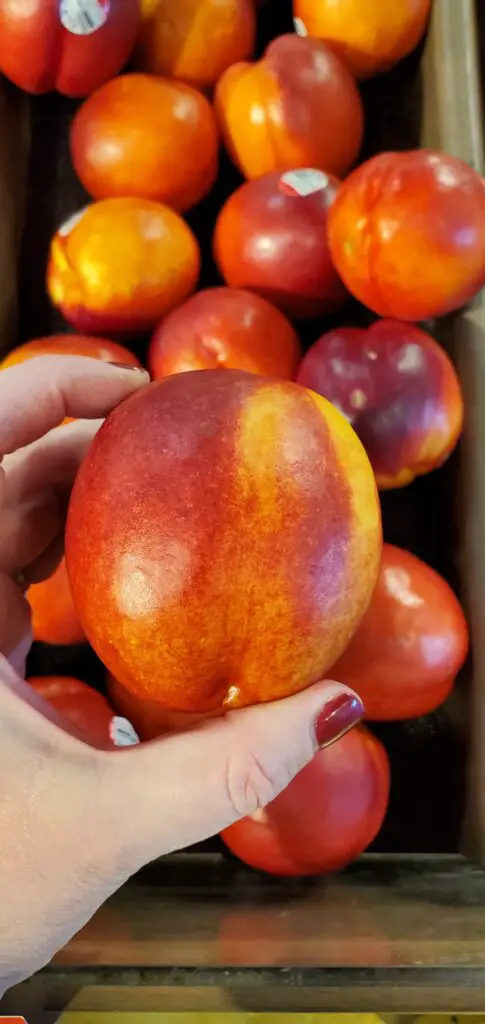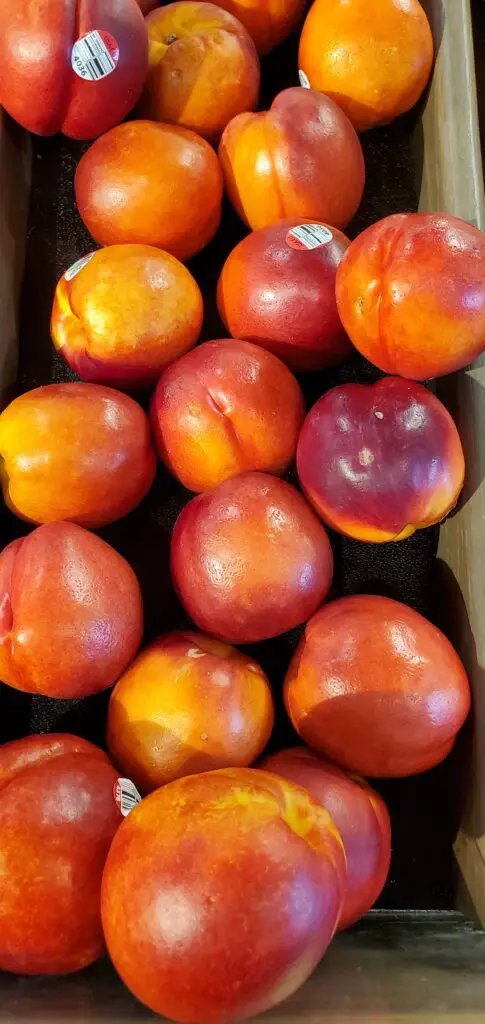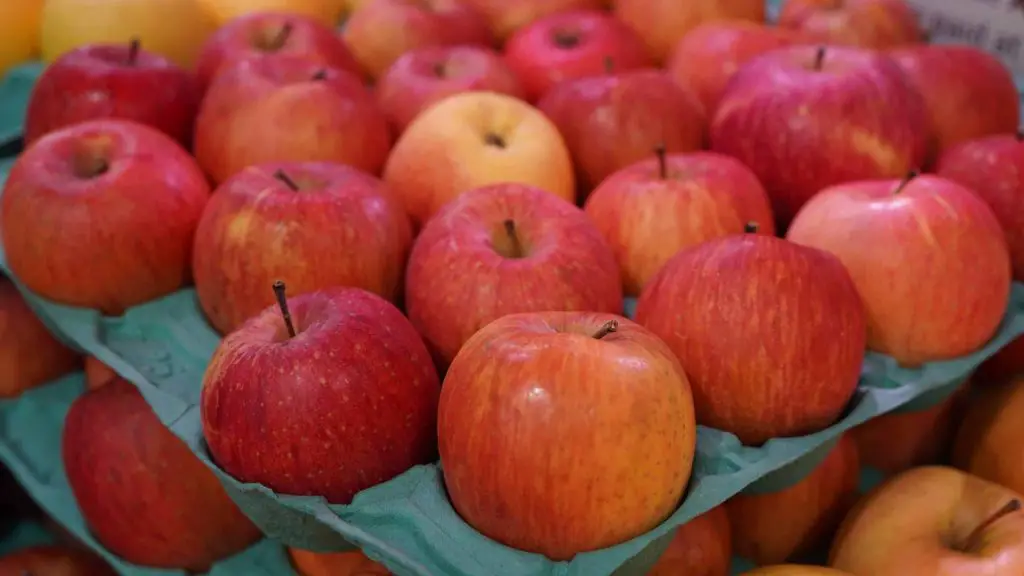Nectarines are a delicious fruit that make a refreshing summer treat for humans. Dog owners love to share a bit of sweetness with their canines. This is especially true when they are patiently sitting and looking at them enjoying a nectarine. Can dogs eat nectarines?
The flesh of the nectarine is not toxic to dogs. However, there are many cautions dog owners should be aware of before tossing their pooch a piece of nectarine.
In this article, Can Dogs Eat Nectarines, you will learn about the nutritional value of nectarines for dogs, how much nectarine is safe for your dog to consume, and the potential dangers of nectarines and canines.
- Nutritional Value of Nectarines for Canines
- Best Way to Serve Nectarines
- How Much Can My Dog Eat?
- Potential Concerns for Serving Nectarines to Dogs
- Alternatives to Nectarines
Nectarines are genetically similar to peaches, they are considered “the smooth-skinned cousin” of the peach. The way you prepare nectarines and the quantity that is safe for your dog can also be applied to peaches.
Can Dogs Eat Nectarines? – Nutritional Value of Nectarines for Canines
Nectarines are a juicy fruit that provides humans and dogs with many health benefits.
- Vitamin A is necessary for healthy coat and skin. It supports good vision health. It is also necessary for building muscles.
- Vitamin C lowers inflammation in the body, builds immunity, and has antioxidant properties.
- Magnesium is a mineral that aids the body in absorbing nutrients and contributes to bone health.
- Potassium is an electrolyte vital for good health. It is necessary for properly functioning heart, nerves, and muscles.
- Dietary fiber aids in digestion and regular elimination for your dog.
- Abundant antioxidants reduce the buildup of free radicals that damage cells. They are crucial to slowing down the aging process and contain anti-inflammatory properties.
Feeding your dog small pieces of nectarine is a great way to add healthy fiber to your dog’s diet. Fiber is essential for good digestion and bowel health.
Rich nutrients such as vitamin A, vitamin C, beta carotene, and antioxidants found in nectarines can give your dog’s immune system a boost.
Related Posts:
- A Review of the 5 Best Peanut Butters for Dogs
- A Review of the 5 Best High Fiber Dog Foods For Anal Gland Problems
- How to Get a Dog To Take a Pill

Can Dogs Eat Nectarines? Best Way to Serve Nectarines
Can dogs eat nectarines? When prepared appropriately dogs can enjoy small morsels of nectarines. When purchasing a nectarine avoid fruit that is bruised, green or has wrinkled skin.
How to Store Nectarines. Nectarines and peaches will continue to ripen after they are harvested. It is best to leave them at room temperature until they are fully ripened, ideally out of direct sunlight. If they are refrigerated too soon, the fruit will lose much of its flavor and have a mealy texture.
Testing for Ripeness. Give the fruit a gentle poke to test for ripeness. When the fruit is soft, it is ready to consume. Store any ripened fruit in the crispier drawer in the refrigerator. Ripe nectarines can be placed in a reusable plastic or silicone bag until ready to eat.
Consume the fruit within three to five days after refrigerating.
Wash & Prepare. Fill a large bowl or your kitchen sink with 4 c. of cool water and one cup of white distilled vinegar. Let the nectarines soak in the vinegar/water solution for 10-15 minutes. Rinse with cool water and air dry.
Slice & Serve. Make a slice down the seam of the fruit. Twist to separate the fruit in halves. Remove the pit and discard. The remainder of the fruit can be cut into several lengthwise pieces.
When serving this fruit to your dog, make the pieces small enough for your dog to eat. When first introducing a new food to your dog, always start with small pieces and monitor.
One fun way to serve this fruit is to puree it in a blender for your dog. You can mix in pureed pumpkin or carrot, place in small silicone molds or an ice cube tray. Freeze. Offer your dog one “cube” on warm weather days.

Can Dogs Eat Nectarines? How Much Can My Dog Eat
While the flesh of nectarines is a safe fruit for your canine to consume, too much can cause digestive issues. Feeding your pooch appropriate portions would be beneficial to their health and not cause side effects.
Portion recommendations of feeding just the flesh (not the pit) of the nectarine to your dog is a maximum of 2-3 times a week.
Small dogs can safely consume 1-2 slices.
Medium sized dogs can eat 2-3 slices.
Large to Jumbo size dogs can consume between 4-5 slices at one setting.
The above portion recommendations should be adjusted if your dog is experiencing loose stool or unusual flatulence. It is always best to monitor your dog for any discomfort after introducing a new food.
To prevent the fruit from fermenting in your dog’s gut, share your nectarine between your dog’s regular feeding times. Start slowly with ¼ of a slice.
Related Articles:
- A Review Of The Top Five Best Foods for Hiding Dog Pills In
- A Review of the Top 5 Best Dog Bones For Aggressive Chewers
- A Review Of The Top 5 Best Bone Broths for Dogs

Potential Concerns for Serving Nectarines to Dogs
Can dogs eat nectarines? Fruit, specifically nectarines, can be a healthy supplement or treat for a dog. However, every dog owner should know the potential concerns of serving nectarines to their dogs before offering that first little sample.
Too Much Fruit. When a dog eats too much fruit it can cause gastrointestinal issues like vomiting, flatulence, and diarrhea.
Avoid Canned Nectarines. Canned fruit contains too much sugar for a dog. The added preservatives are not a healthy choice for your pooch either. Foods high in sugar increase the risk of weight gain and diabetes in canines.
Related Articles:
- Ultimate Guide: How To Take Care Of A Puppy
- Ultimate Guide: How To Take Care Of A Dog
- Ultimate Guide: How To Take Care Of A Senior Dog
- The Benefits of Owning a Dog
- Top 12 Tips for First Time Dog Owners
Spoiled Nectarines are Toxic. Dogs can eat fresh nectarines. All spoiled fruit is toxic to dogs, so take extra care to make sure your dog does not have access. The biggest health issue with dogs consuming rotten fruit is mycotoxin poisoning, which is caused by the mold that grows on the fruit.
Fruit that has begun to decay also produces ethanol, which requires immediate professional care. Symptoms of fruit toxicity include repeat vomiting and loss of muscle control.
Pits Cause Issues. Nectarines are a stone fruit, meaning that in the center of the fruit is a pit (or stone). If your dog swallowed a pit, first make sure it did not cause an airway obstruction and then follow up with your local veterinarian. Symptoms of an obstruction can include painful abdomen, decreased appetite, vomiting, and/or lethargy.
The pit also contains trace amounts of cyanide which can cause drooling, panting, or vomiting.
When you have a dog that steals food off the container, remember to keep your fruit out of reach and inaccessible.
Related Articles:
Alternative to Nectarines
Certain types of fruit can be healthy additions to your dog’s diet. Kiwi fruit is a nutritious and hydrating food that can be eaten in small portions by dogs. Another fruit that beneficial to your dog’s health is cantaloupe. In bite size portions, cantaloupe can provide your dog with necessary B vitamins.
Whenever you are unsure of the portions that are healthy for your dog, call your veterinarian for professional advice.

Can Dogs Eat Nectarines?
This juicy food is a safe fruit for your dog to eat. Your dog can benefit from the many vitamins and minerals available in nectarines.
Wash your fruit well before slicing and consuming it with your dog. Remember to keep your portions small and monitor your pooch for any discomfort.
Be sure to remove the pit and discard before eating nectarines. Spoiled fruit is not okay for your dog to eat. Fresh, not canned, nectarines can be a healthy snack or supplement to share with your dog.
Please read our Legal Disclaimer

